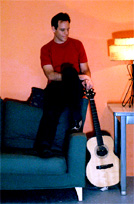 |

Comment
on this story
What:
David Wilcox
When:
Thursday, April 15, 7 p.m. and 9:30 p.m.
Where:
New City Cafe
Cost:
$15
|
Soft-spoken Intensity
Singer-songwriter David Wilcox crafts light music with passion
by Lloyd Babbit
It seems dubious to call David Wilcox a folk singer, songwriter or storyteller. Clearly he fits the description, having released 11 albums in a span of nearly two decades, and consistently selling out shows across the country. But Wilcox is much more than that.
It would be more accurate to call him a tour guide of the heart and soul.
“I was just looking for anything that would keep me afloat from that depression,” says Wilcox from stage at a recent theater show. “In the event of a water landing your guitar may be used as a personal flotation device. And I don’t know how it works. It just stirs something in me. I never knew my heart was supposed to feel that good.
“I know the world doesn’t need another song, and it sure doesn’t need another songwriter, but it was just the way my heart understood what I couldn’t feel directly. It was a compass to follow; it wasn’t the destination. And I think it’s the same for whatever stirs your heart. You can trust it. You would give up much more by not following it than you ever would by following.”
Music has been a journey for Wilcox, a means to understand himself in a way he otherwise wouldn’t have been able to.
“I think that the guitar was the first window into knowing that my heart could feel that good,” he says later by phone on the way to a show in the Northeast. “I wouldn’t have known otherwise.... It’s a mystery to me. It’s not the music itself that does it. It’s sort of like the Zen and the Art of Archery book. The point is not to hit the target. The goal is not to have more songs. The goal is that music is the place where I get my joy. I don’t know. It’s a very strange thing.”
Wilcox isn’t one to keep that joy all to himself. He shares with his audiences the internal exultation, along with plenty of other shades of emotional intensity. Soft-spoken, thoughtful, and vulnerable, Wilcox takes his listeners by the hand and shows them themselves. Alternating between story and song, the humorous and the emotionally heavy, he traces roads of fear, uncertainty, romance, joy, and emotional alienation.
Wilcox says he prefers the songs that are weighty. But he’s not above singing songs like “Moe,” an exploration of his father’s uncanny resemblance to the Three Stooges’ character, or “Start with the Ending,” an amusing look at relationships if they were truly honest.
“I do try to give the audience a break,” he says. “My choice would definitely be to give people kind of these life and death songs because that’s what I needed from music. But I understand the need to break away from that. The music has to be light because the topics are so heavy.”
Wilcox also likes to make his live performances spontaneous. He never uses a set list. And he relies on the audience to show him where to take his shows. Occasionally, he will even ask for an audience volunteer, and then compose a song for that person from the stage.
“The more unusual the better,” he says of the practice. “I will ask for names and details so I can get behind the anger and emotion. It’s sort of like therapy. It takes a turn and often surprises us. I do enjoy that, especially when it helps the audience realize that it’s just for them that the music is for and that it’s spontaneous.”
But despite his years of experience, and his control of the stage and his audiences, Wilcox says he’s just now feeling at home with what he does.
“This craft that I work at is so elusive that I can work at it for a lifetime and just now realize what it is I want to write about,” he says. “On this last record, it’s just being alive, living a complete life. It’s celebrating the joy and the wonder and the awe. That’s where I want my life to go, so that’s where I go in song first.”
And, he’s found, the best way to do that is to simply live life.
“I like to take a lot of small trips, so I’m out eight to 10 days a month, and the rest of the time I’m home working and spending time with my family,” he says. “The real homework of a writer is living an interesting life, a full life. The input is the output. You have to have something to write about.”

April 15, 2004 • Vol. 14, No. 16
© 2004 Metro Pulse
|
|